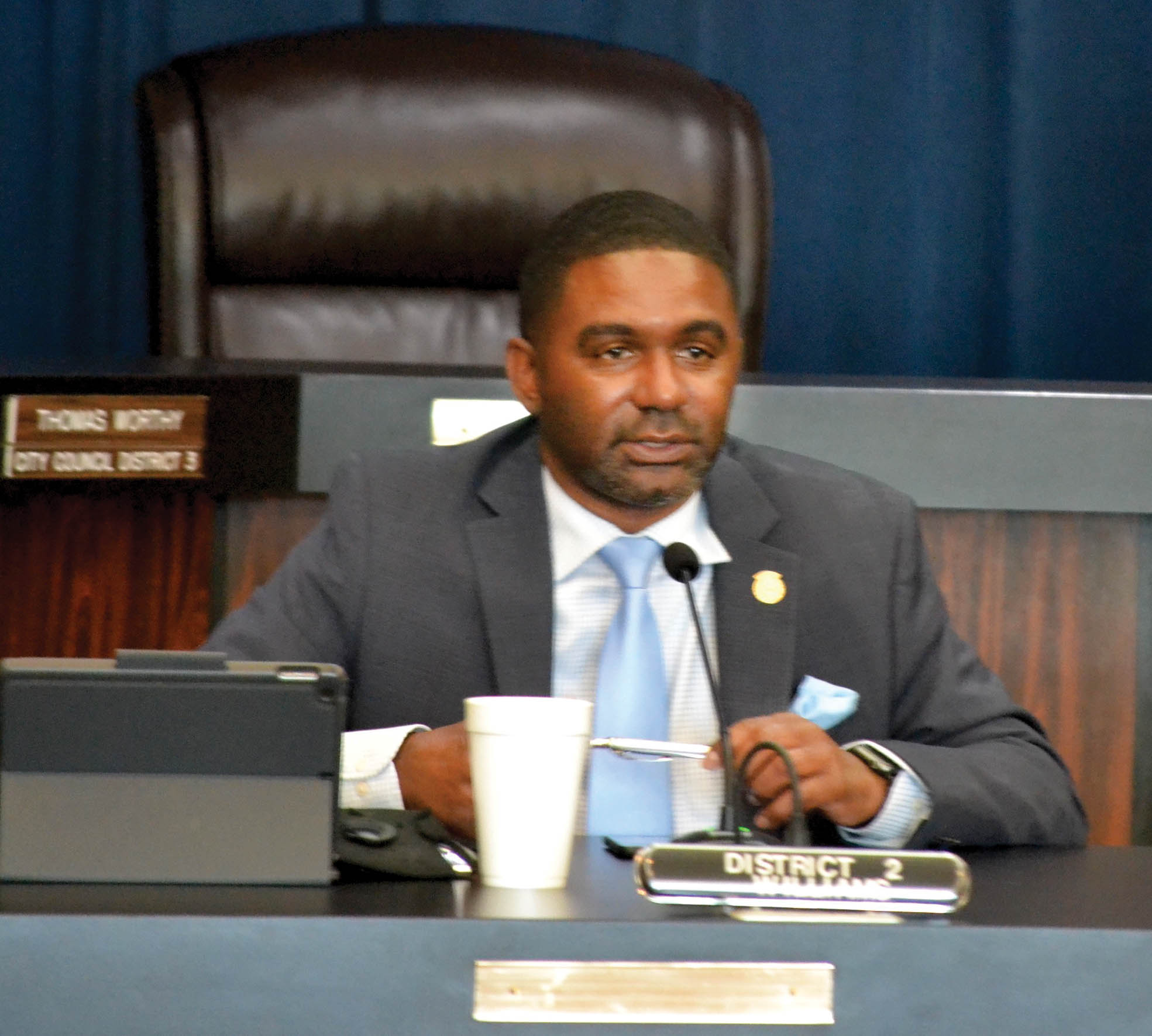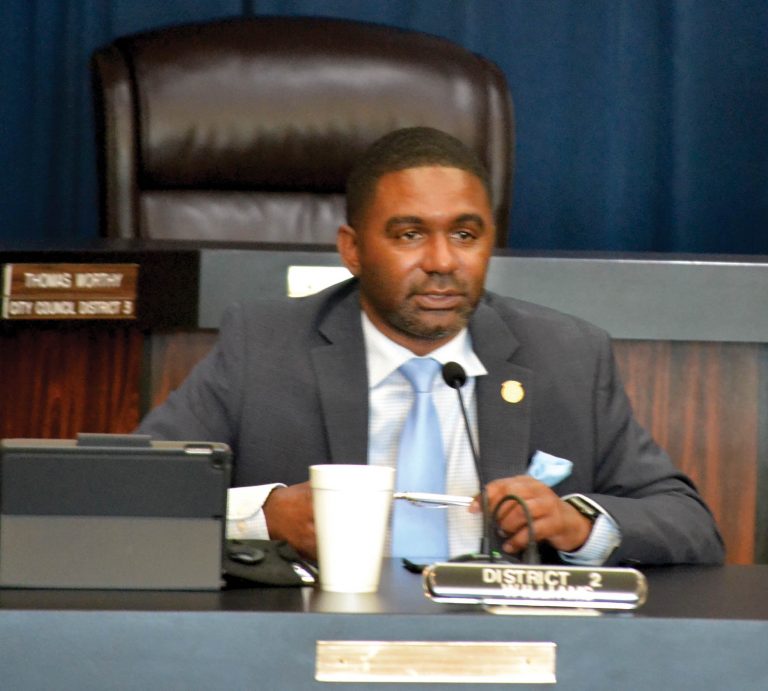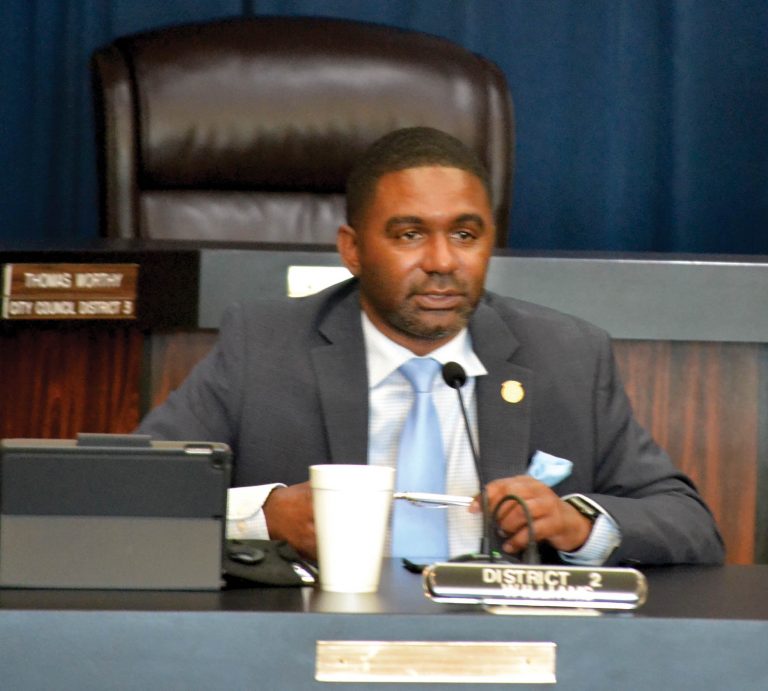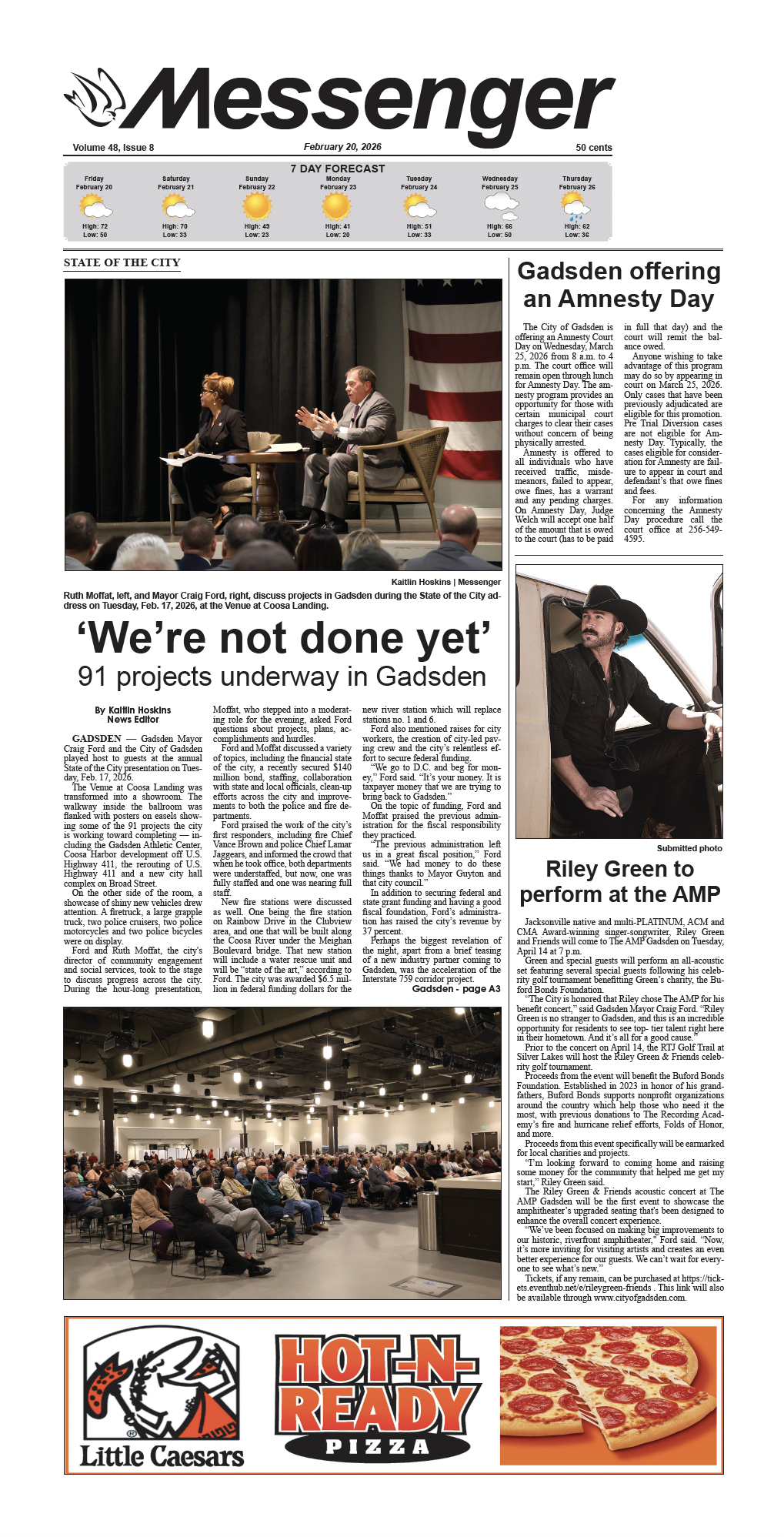By Katie Bohannon, News Editor
Gadsden City Council members Deverick Williams and Jason Wilson joined together for a press conference on Tuesday, September 8 to discuss a committee that has been in the works for months.
Williams and Wilson announced the formation of the Human Relations Advisory Committee (HRAC) to facilitate equitable opportunities in all aspects of community life in Gadsden.
Wilson and Williams first proposed a committee like the HRAC months ago during a series of city council meetings that addressed community concerns regarding racial discrimination and inequality. Both council members shared their desire for a group of individuals uniting together to discuss the tensions and social issues affecting Gadsden and formulate recommendations to develop positive responses to these problems.
“We are seeing [the HRAC] as an opportunity,” said Williams. “We appreciate the council for being willing to commission this subcommittee. We’ve used subcommittees in the past to address a number of issues to make recommendations to the mayor and council, and this is another opportunity for us to use this platform to create some dialogue. We’re not going to run from the issue of race, the social issues that are present. As Americans, I think it’s important for us to hit head on some of these issues…just because we don’t talk about them, or make a decision not to talk about them, doesn’t mean they’ll go away.”
Williams shared a recent personal experience relevant to the HRAC’s purpose, where he encountered a sheriff’s deputy who referred to him as “boy.” The word “boy” has historically been referenced as a derogatory term to describe black males. While Williams believes partially that the sheriff’s deputy meant no harm and simply used the term because he appears younger than his age, there is a part of him that understands the reality of the situation.
“None of what we’re going to talk about today is intended to be divisive or confrontational,” said Williams. “What we’re wanting to do is build bridges. The whole purpose of sharing that story is I wanted people to understand you can’t ignore it…it’s here. This is an opportunity for us to address a lot of it.”
Wilson acknowledged the bias that fuels division nationwide, commenting that Gadsden is not immune to strife. The goal of the HRAC is to give a voice to all perspectives in the city, allowing for a healthy discussion to formulate about the social issues affecting Gadsden’s citizens.
“Having one group of our citizens standing on one side of the street yelling and having a group of citizens standing on the other side of the street yelling is a bad thing in any community,” said Wilson. “There is a right way and a wrong way to have civil conversations about issues that are affecting our community, and you can’t just say, ‘Well, I don’t feel that way, so it’s not real.’ You can’t just say, ‘Well, I’ve never experienced that as a kid, so it must be fake.’
“What we all have to do as citizens is elevate our own perspective and say I recognize that even though I didn’t have that experience growing up, or even though I have had certain experiences that shape my opinion, there are 330 million people in this country and they all have different experience and they all have a different perspective – and every one of them is equally valid, and has the right to be heard.”
Educators, historians and attorneys assemble portions of the HRAC, serving as members, subject matter experts and community representatives.
The members will include Williams, Wilson, Daphne Sims, Ahmad Deramus, Kirkland Back, Jaden Bostic, Craig Scott, Mario Gallardo, Michelle Bradford, Demetrius Castleberry, Wayne Watts and Ernestina Cady-Hardrick.
Subject matter experts will include Emma Hazlewood Clapp, Danny Crownover and Lynn Pruitt, while community representatives will include Robert Hunter, Ja’Michael Edwards, McKenzie Clark and Adrienne Reed.
“I think the city has an opportunity to feel proud,” said Williams. “There are a lot of bright minds on this committee and a lot of people who are going to add some real value to the process.”
Williams noted that to avoid any conflicts, the HRAC will not formally name any city employees to the committee, though individuals may support in an advisory capacity. He also commended Wilson’s emphasis on including representatives under the age of 30 to work with the committee, addressing the importance of a healthy relationship between political discussion and youth.
“[Younger individuals] may not understand all the nuisance items relevant to the civil rights movement, but they are living some of these issues today and really should have a voice in the discussion,” said Williams. “That is one of the things I’m excited about – having all those young people be able to participate, and having those young people to hear from people who have actually been through what many of us consider the modern day civil rights movement in the 1960s.”
“My intention with this committee (and including representatives under 30) is to try to grab hold of those individuals (who want to be engaged in the political process) and bring them closer to the political process and educate them more about the political process,” said Wilson. “Hopefully, they turn into valuable future leaders at some point after we’re all gone.”
The HRAC’s action plan includes identifying city owned property that is subject to the Alabama Memorial Preservation Act, holding public meetings to receive input on civil issues impact the community at large and recommending programs, policies and activities to reduce discrimination, increase cultural competency and promote civil and human rights for all citizens. The action plan will also focus on preparing a summary of recommendations and submitting those suggestions to the mayor and city council, while monitoring and assisting with the implementation of recommendations adopted by the mayor and city council.
All aspects of the HRAC will be conducted on a volunteer basis, and the committee will have no budget. The HRAC will have access to municipal meeting spaces and may request the input or attendance of city employees, at the sole discretion of the mayor’s office. Meetings will be governed by the Open Meetings Act and will be subject to city council rules and procedures. A representative of the city clerk’s office will attended and record minutes for HRAC meetings.
Wilson noted that the reason city council members do not run under a party affiliation is because political parties do not matter in local politics. What does matter, however, is how people working symbiotically unite to keep their community functioning and growing together for the best interest of all citizens.
Wilson shared that to his knowledge, Gadsden has not experienced the vandalism or violence other cities have suffered throughout the country. Part of the HRAC’s focus is to maintain that peaceful record, to nurture calm and civil discussion that will implement positive change. He acknowledged the role national politics plays in people’s perspectives on issues, but implored Gadsden residents to consider what is truly important: their city, their neighbors and their home.
“We are not Seattle,” said Wilson. “We are not New York. We are not Washington, D.C. We are not Chicago. We are Gadsden, Alabama, and all I care about is Gadsden, Alabama. We’ve become so engulfed in national politics that we forget what really matters, which is our neighbors, our communities, our households and the people we know. These are the people that you see every day, that you go to church with, that you work with. In some cases, they’re your doctor, your lawyer, your accountant, the person who cooks your food or changes your oil – these are members of our community and that’s different.”
The HRAC’s first meeting is scheduled for Tuesday, September 22. The committee is planning to meet once a month. The HRAC’s initial meeting will serve as an administrative meeting where members will determine one another’s level of availability, exchange contact information and gain a general understanding of the working groups present. The committee will begin prioritizing the list of issues members plan to address as well.
While Wilson surmised that ideally a committee like the HRAC remains intact until it is no longer needed, he and Williams hope to work diligently to address major issues within the community and propose potential solutions to the council to evoke beneficial change quickly and effectively. Though the HRAC is just beginning, Williams closed with a few words on his vision for the future.
“We are going to be very deliberate in making sure this is not something negative,” said Williams. “It’s definitely something that is viewed positively and gives this group the opportunity to present some meaningful suggestions. This is not going to be a Councilman Williams and Councilman Wilson show – these folks are all independent thinkers. We’ll facilitate discussions to a degree, then they may decide they want to elect officers or they want to elect a leader other than us. That’s fine. We just want to make sure they have the opportunity to walk through this process, and come out of it with a meaningful set of recommendations for the council.”






